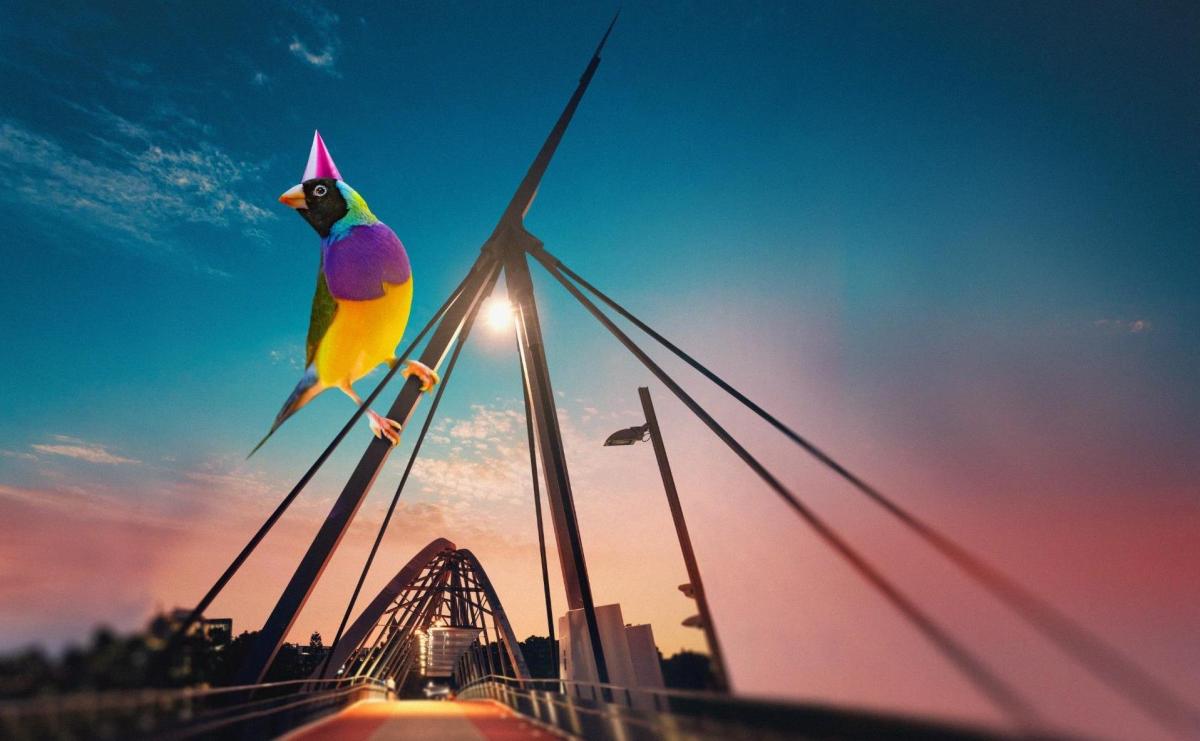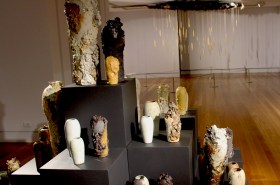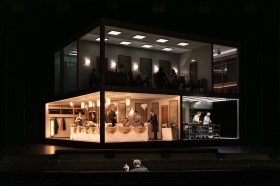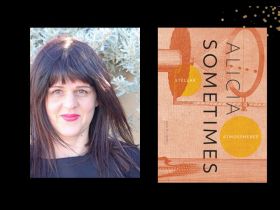The great pause of COVID-19 has turned theatres dark, silenced poets, shuttered libraries and shrouded galleries. Once the pandemic has passed, great art will help console us, connect us and help us comprehend the full extent of the calamity.
Here artists, arts leaders and arts workers from across Australia reflect on why we’ll soon need art as never before.
Adam Wheeler, Artistic Director, Tasdance
‘I was going to start with: asking an artist why we need great art feels similar to asking why a fish needs water. But then what dawned on me as I cringed at my own cliché is the idea of “after COVID-19”. There is no after COVID-19. Once the restrictions are lifted, a vaccine is in place and we can gather again, the effects of COVID-19 will still be with us and great art is what will help us reflect and deal with the trauma, the loss and the revelations.
‘The great art will let us escape the ramifications of isolation and economic dysfunction or put a mirror to them. The great art will unite communities, create a focal point in the fog and deliver all of us a purpose as we navigate the new world described as before COVID and from now on.’
Alirio Zavarce, actor/director and Artistic Director of True North Youth Theatre Ensemble and True Ability
‘We, as humans are living in a strange unprecedented time where everyone is wearing masks, yet the theatres are closed. After COVID we will need great art not for art’s sake, but for the sake of us as humans.
‘The pandemic has robbed us of the most vital element of our practice: Human Connection. We need each other to tell stories, to laugh, to cry, to experience something together. I am excited to see a new era – a theatre that connects and engages with the audience more than ever. Out of isolation, we will need great art because we need each other, and art offers us a unique way to process our experiences, to laugh at them, defy them or to escape from them.
‘We will need great art that reflects the changes in our collective perspective.
‘I think of our current obstacles not as The End of the show, but as an Interval. In isolation we have been dreaming new dreams, I think we all need to start getting ready for a great 2nd Act. We are all waiting to see what great things have been created behind the curtain.’
Eva Grace Mullaley, Artistic Director, Yirra Yaakin Theatre Company
‘We weren’t prepared for this, but we never could have been. We’ve been preparing for the fast and immediate apocalypse. But no one thought it would come in this way – the slow burn. Despite not being prepared, we have to recognise that for the arts, isolation is nothing new and for First Peoples, restrictions are nothing new.
‘While we are the most vulnerable and most affected during this time, we will lead the way out of this and use art and storytelling as medicine and healing, as we have always done. This is how we recover as a society, together. Recognising that change is good and our health as a nation relies on our artists being able to express themselves and our audiences being able to see themselves represented in the national landscape.
‘We need great art more than ever now to show people that society is OK, but this is our opportunity to learn how to do better and that we can grow from this.’
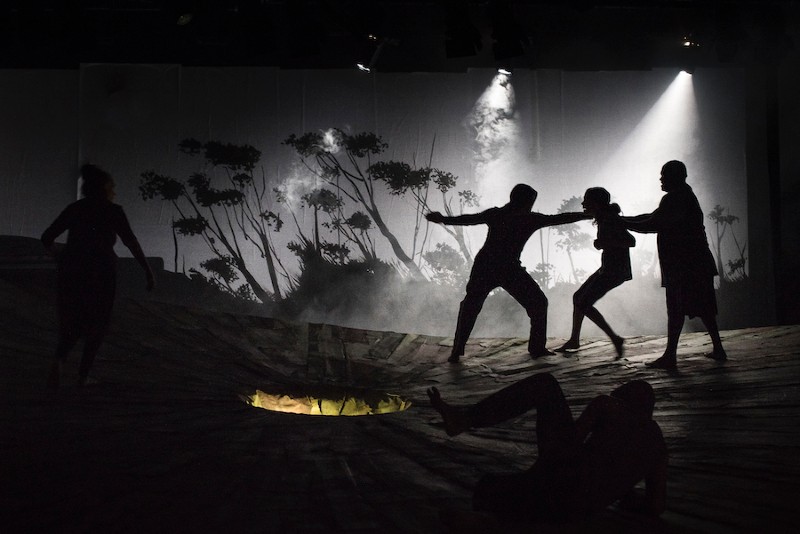
A scene from Yirra Yaakin’s 2020 production for Perth Festival, Hecate. Photo credit: Dana Weeks.
Jane Tonkin, Executive Producer, Corrugated Iron Youth Arts
‘The arts have played a crucial role during this time which will only grow as restrictions shift. The arts will lift us up and out of the pandemic into a new existence where greater flexibility and a more significant creative approach to problem solving is required. This is the domain of the arts. We know the arts have a positive impact on health and well-being, as well as bringing us constant joy, whether as artist, participant or audience. Great art tells our story and reminds us about the importance of the human experience – and this will be an essential part of our recovery.’
Joanne Kee, Executive Producer, National Theatre of Parramatta
‘Our world has been disrupted in ways our generation never envisaged. Within this new order the realities of our changing environment, our inhumanity, privilege, and prejudices have been laid bare.
‘Art provides a window through which we can make sense of what it is to be human, gaining a better understanding of how we inhabit our planet, throwing down the gauntlet for positive change. As social beings, post-pandemic theatre and performance offers us a gateway for communal catharsis. This is our chance to recalibrate the world through great art.’
Joshua Hoare, Artistic Director, Cirkidz
‘Art is the way we make sense of change forced upon us, so we need great art more than ever. Great art makes us feel the world in our blood and sinew. It’s how we rehearse our possible futures, and step underneath someone else’s skin. COVID will speed up change enormously, so we should be speeding up support to our story tellers, to our makers and movers, so that we remain in control of who we’re becoming.
‘When the world is too complex to fully take hold of, art gives us the chance to grab on to something. It’s a contemplation with our pens and brushes, with our words and bodies.’
‘When the world is too complex to fully take hold of, art gives us the chance to grab on to something.’
– Joshua Hoare
Lindy Hume, Ten Days on the Island
‘Humans need art. This essential quote from director Declan Donnellan explains why: “We assemble in a space and divide into two parts, one of which enacts stories for the remainder… A theatre is not only a literal place, but also a space where we dream together; not merely a building but a space that is both imaginative and collective.”
‘When restrictions lift, we will all be looking out at a changed landscape, literally and figuratively. When COVID is under control and the combined impacts of the bushfires and the pandemic on human society, on us as individuals, and the environment can be clearly seen, a wholesale reimagining will be profoundly necessary. As we regroup for the next upheaval (and the next) the imaginative skills of artists will be among the most powerful tools society has at hand to conceive, design, shape and animate more purposeful, resilient, and empathetic human communities.
‘We urgently need artists with sharpened tools and bold imaginative capacities to help us to contemplate and amplify the ethical questions of our time, to animate new modes of active citizenship and express our civic values, to bring us together and reconnect us to our communities and the places around us. This practical imagining and collective dreaming is what artists and great art give us.’
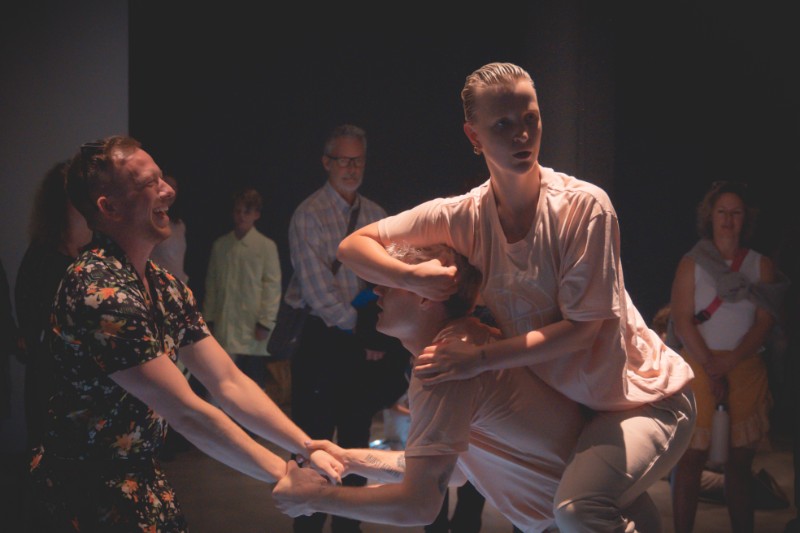
Amber McCartney and Kyall Shanks in Reactor by Tasdance + Stompin. Image by Gabriel Comerford.
Louise Bezzina, Artistic Director, Brisbane Festival
‘We need great more than ever now – full stop. We cannot wait until restrictions have been lifted. It is absolutely critical to the wellbeing of our community that we find ways now to safely deliver artistic experiences to our communities. Who knows when we will be out of this perilous state?
‘We need empowerment of artists to be supported financially, emotionally and how to safely do work in these unusual times. As I said in my speech on Tuesday morning at the 2020 Brisbane Festival launch, my final thank you goes to the artists – to the stars of the show. Without you, we have nothing. Without your dreams, passion, tenacity, and provocation our world becomes very gloomy and we do not need any more gloominess! There are ways to present work in these times and leaders must enable and facilitate these opportunities to take place immediately. We need to ensure that there is a great sense of public value for what we do and the work of artists and that will take all of us to think differently and put egos aside.’
Read: How to deliver a festival during a crisis
Meg Wilson, Interim Director, ACT Writers Centre
‘COVID-19 has completely shifted our experience of “normal life”. In the face of COVID, art has never been more important. Great art has the power to influence our opinions and question our way of life. This pandemic has shown how truly important art in all its forms is; it has comforted, provided an escape in times of fear and united people during this uncertainty.
‘Artists have the ability to create something that evokes different reactions from each individual, it can inspire hope, cause reflection, unbridled joy and a raft of other emotions. Art is the creative expression of the human spirit and it needs to be nurtured, celebrated, curated and experienced.’
Natalie Rose, Creative Director, Shopfront
‘To me, it’s something that everyone can understand and can see themselves in. Something that everyone can “get” while being entertained along the way. It’s like seeing a wonderful counsellor. They ask you some questions and you think you’re figuring it out together but really in the end, they knew where they were taking you all along.
‘When I was first exposed to art as a contributor I was overwhelmed. It was productions of Blackrock, Summer of the Aliens, and my HSC dance piece, which was possibly ahead of its’ time – focusing on the contraction of a vagina. I suddenly felt that I could say what I wanted and people would listen. Great art is that for me – being able to hear someone’s thoughts without having to actually listen to them talk. Put a little glitz around it and it makes it more palpable.
‘It’s being able to have a conversation with others without actually talking. It’s about imagining something; being somewhere or someone else. Great art makes you contemplate where you sit in the world. It’s about finding people like you. It’s an escape, it’s a timeout and we could all do with more of that right now.’
Patricia Cornelius, playwright
Why we’ll need great art more than ever after COVID-1919, by Patricia Cornelius.
A short scene: Two see their first play since COVID. They laugh, it’s witty, they’re happy to be at the theatre again.
One: It was funny and it warmed my heart but I feel cheated. Is that what we’re going to be served up? Warm, good-hearted fun.
Two: It can’t all be bleak, slit-your-wrists stuff. Or didactic crap. If at least it makes me laugh.
One: I want more; a sense of urgency, something that enrages me, brings clarity to the fug we’ve been living in, breaks my heart, challenges me, makes me quake in my boots. And throws in a laugh or two. It’s got to be great or at least be aiming for great. Or I’m not going again.
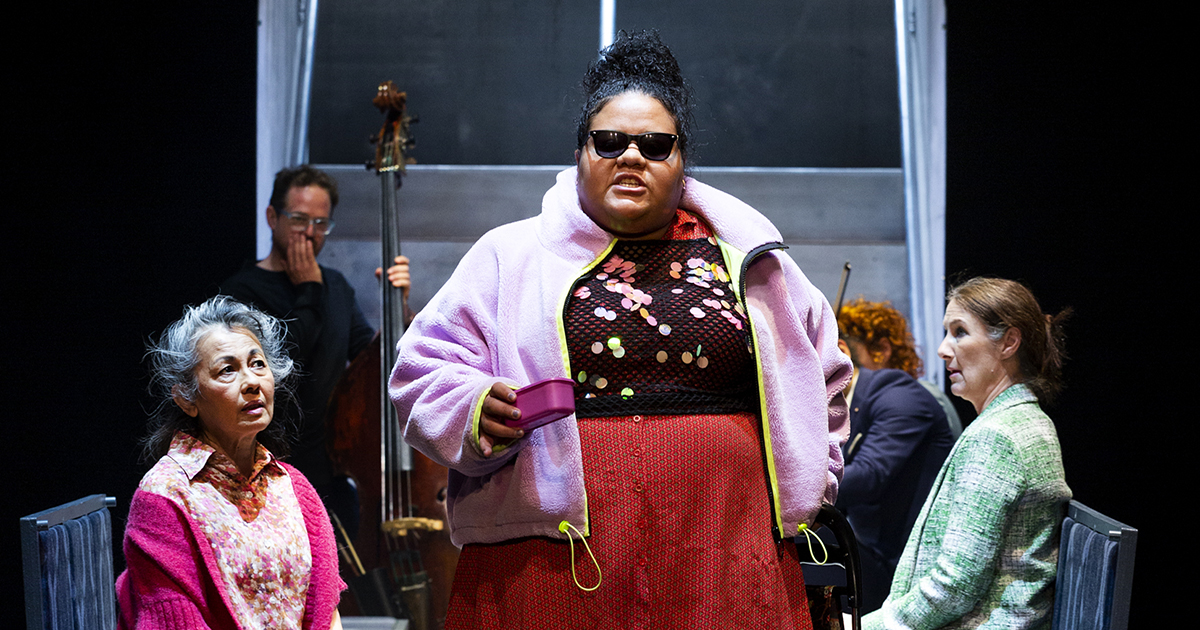
A scene from Anthem by Andrew Bovell, Patricia Cornelius, Melissa Reeves, Christos Tsiolkas and Irine Vela. Produced by Performing Lines in association with Arts Centre Melbourne.
Richard Mills AM, Artistic Director, Victorian Opera
‘The need to assemble and share is fundamental to human nature; we are social beings, drawing mutual enrichment from the experience of being together. The pandemic has focused into sharp relief something we have taken for granted for almost a lifetime. The dark days have provided an opportunity for reflection so that the former blithe certainties of days of freedom will be seen in a new perspective.
‘I hope we will be more receptive to the great heritages of our culture and the power of art to speak to us not only individually, but also to affirm something of lasting value; something profoundly affirmative about our connections to the past and to each other when we are present as an audience at great performances of great literature. This shared experience is a civilising force, reminding us of our profound capabilities for the extraordinary. We need it now more acutely than ever.’
Sally Bothroyd, Executive Director, NT Writers’ Centre
‘Great art – whether literature, theatre, film, dance, visual – is always needed. In my opinion, what is more important when restrictions are lifted is the support of audiences, funders and the entire community so the entire creative arts community can recover – both financially and emotionally. There will be no great art without artists!’
‘The dark days have provided an opportunity for reflection so that the former blithe certainties of days of freedom will be seen in a new perspective.’
– Richard Mills AM
Travis Tiddy, Artistic Director, The Uncomformity
‘From a regional perspective, on the remote West Coast of Tassie, we see time and again how artists have a catalytic role in our community. Thinking laterally and challenging conventions has been central to our community actively reimagining its future.
‘These qualities are so important in this time of such huge, transformational change. Innate to the creative process is the willingness to expose often harsh realities, expand perspectives and think and act collectively. For artistic practice to reach as diverse an audience as possible is integral to our healing and rebuild from COVID-19.’
Vic McEwan, Artistic Director, The Cad Factory
‘I often find that conversations about the essentialism of the arts can walk a fine line between “twee” rhetoric and inspiring call for change. What are we asking for when we claim the essential status for the arts in a post-COVID world? More investment in our institutions? Change in government policy that provides a real and perceived support for the not-for-profit arts sector? Acknowledgment that artistic practice isn’t separate from the world around it? An understanding of our own role in making this change happen?
‘Whatever it is, my understanding of shared responsibility means that I must figure out my responsibilities, then try to work through the muck.’
Wesley Enoch, Artistic Director, Sydney Festival
‘Art is good for your health. Culture is good for your community. Story is good for your sense of self.
‘During lockdowns and restrictions people have turned to arts and culture to get through. Books, music, podcasts, live streaming of performances, works made for screen, digital galleries, cooking, conversation…. you name it, the power of the arts and culture have been demonstrable.
‘We have been reminded that when things are tough we turn to arts and culture, when we want to connect we turn to arts and culture, when we want to celebrate we turn to arts and culture, when we want to collaborate we turn to arts and culture, when we want distraction, entertainment, beauty, meaning, calm spaces, excitement… arts and culture are our collective go to.
‘Arts and culture are so omnipresent most people take it for granted. Arts and culture become like the air we breathe and like air we only recognise it when it is absent.
‘Arts and culture become like the air we breathe and like air we only recognise it when it is absent.’
‘The mental health benefits are obvious but also the concepts of social cohesion and collectivism have been enhanced through engaging in the arts. Even at our most atomised as a society we have been brought together under a single vision to save lives and keep communities safe.
‘When we are ready to embrace a recovery strategy, arts and culture will be the next invitation to connect with a grand social vision. We should be looking now at what is ahead of us – economic recession, climate change, interracial tensions, First Nations Sovereignty, the age divide. Arts and culture can play a role in stimulating discussion and debate that can engage our country in a vision for a future. The pandemic has highlighted underlying stresses in our community and to avoid destructive rupture and division we need to find ways to come together.’
